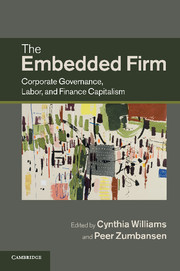Book contents
- Frontmatter
- Contents
- Figures
- Tables
- Contributors
- 1 Introduction: corporate governance after the ‘end of history’
- Part I Historical trajectories of business and regulation
- Part II New interests, new shareholder constellations, new landscapes
- 8 Beyond the Berle and Means paradigm
- 9 Pension funds as owners and as financial intermediaries
- 10 Credit derivatives market design
- 11 The EU Takeovers Directive: a shareholder or stakeholder model?
- 12 “Law and finance”
- Part III Labor’s evolution in the new economy
- Part IV The transnational embedded firm and the financial crisis
- Part V Conclusion
- Index
- References
12 - “Law and finance”
inaccurate, incomplete, and important
from Part II - New interests, new shareholder constellations, new landscapes
Published online by Cambridge University Press: 07 September 2011
- Frontmatter
- Contents
- Figures
- Tables
- Contributors
- 1 Introduction: corporate governance after the ‘end of history’
- Part I Historical trajectories of business and regulation
- Part II New interests, new shareholder constellations, new landscapes
- 8 Beyond the Berle and Means paradigm
- 9 Pension funds as owners and as financial intermediaries
- 10 Credit derivatives market design
- 11 The EU Takeovers Directive: a shareholder or stakeholder model?
- 12 “Law and finance”
- Part III Labor’s evolution in the new economy
- Part IV The transnational embedded firm and the financial crisis
- Part V Conclusion
- Index
- References
Summary
On the face of it, shareholder value is the dumbest idea in the world. Shareholder value is a result, not a strategy … Your main constituents are your employees, your customers and your products.
– Jack Welch, former CEO of General ElectricIntroduction
While virtually all scholars of corporate governance agree that there exist national differences in corporate governance practices and their efficacy, there is an ongoing debate about the relevant dimensions of difference and how they may best be explained. In this chapter, we argue that the strong conceptual and empirical link between law and finance as proposed within the legal origins theory and fully launched in a series of articles by LLSV is inaccurate, incomplete, and yet important. At the least, it is important to get a clearer view of the field such that we may better understand the broader scope of the “law–finance” relationship, particularly as the law and finance theory has had demonstrated effects on international policy developments.
A number of scholars have effectively demonstrated the key shortcomings of this theoretical and empirical unidirectional linkage from law to finance. We do not need to review that literature here, but find it convincing. And, in response to some of their critics, La Porta, Lopez-de-Silanes, and Shleifer have rectified some of their strong and prescriptive former claims. In this chapter, we discuss in Section II what we have learned from this agitated debate with so many policy and real-life ramifications, why it is important to conceptualize a larger and more complex picture of the proposed law–finance causality, what we can learn from existing research on comparative systems in social science, and what we need to study next in the field of research of legal systems and economic sociology. In Section III, we discuss why it is important to get “law and finance” right.
- Type
- Chapter
- Information
- The Embedded FirmCorporate Governance, Labor, and Finance Capitalism, pp. 256 - 274Publisher: Cambridge University PressPrint publication year: 2011
References
- 1
- Cited by



